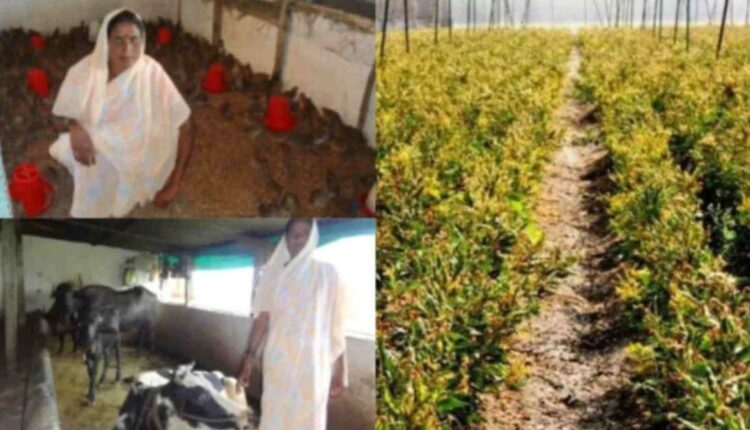Integrated Farming System: Rupesh Kumar Chaudhary achieved success by adopting integrated farming system based on fish farming
Integrated Farming System: In today’s time, adopting integrated farming system in the field of agriculture is proving to be an excellent option for farmers. Integrated Farming System is being adopted on a large scale to increase the income of farmers, reduce environmental impact and ensure stable income.
Under the integrated farming system, various agricultural activities such as fish farming, poultry farming, goat farming and horticulture are done simultaneously. We will know the success story of Rupesh Kumar Chaudhary, who is a farmer and who not only increased his income by adopting integrated fish farming based integrated farming system, but also showed the direction of profitable farming to many farmers around.
Rupesh Kumar Choudhary’s innovation in agriculture
Rupesh Kumar Choudhary, a resident of village Post-Uprama, Block-Rajaun, Banka district of Bihar state, has a total of 6 hectares of irrigated land. On this land, he used to grow crops like paddy, wheat, moong and mustard in the traditional way, but traditional methods were not giving enough profit. One day he visited Krishi Vigyan Kendra, Banka and consulted experts on beneficial measures in the field of agriculture. The scientists of Krishi Vigyan Kendra advised him to adopt Integrated Farming System, after which Rupesh Kumar Choudhary implemented it in his agricultural system.
Importance of Integrated Farming System
Under the integrated farming system, Rupesh Kumar Choudhary started fish farming, poultry farming and better use of farming residues. He constructed a 0.4 hectare pond for fish farming and implemented measures to manage the leftover residues of the fields in a good way. Started making vines from the remains of paddy crop, which were sold as dry fodder to cattle farmers. During this, by spraying waste decomposer on the remains left in the fields, they were converted into organic manure, which increased the fertility of their soil.
Benefits of Integrated farming system based on fish farming
Integrated farming system based on fish farming proved to be an important milestone for Rupesh Kumar Chaudhary. After this, he gave training in mushroom production to 90 families of his village and started mushroom production through them. Due to this, hundreds of families were successful in joining advanced agricultural practices and increased their income.
Rupesh Kumar Chaudhary is earning an income of about Rs 6 lakh every year through fish farming. Apart from this, for his experience and innovations made in the agricultural sector, he was awarded the “Excellent Farmer” honor by Bihar Agricultural University, Sabour in the year 2024. This shows the benefits of integrated farming systems, which not only increased the income of Rupesh Kumar Chaudhary, but also benefited many farmers around him.
The Future of Integrated Farming Systems
In today’s time, traditional agricultural practices are becoming increasingly challenging due to climate change and natural disasters. In such a situation, the importance of integrated farming systems has increased further. Through this system, farmers can not only increase the diversity of their crops, but also increase their income by adding activities like cattle rearing, poultry farming, fish farming, and horticulture. This type of integrated farming system provides farmers with a stable and long-term income source, which also reduces the impact of natural disasters.
Functioning of Integrated Farming System
In the integrated farming system, farmers perform various agricultural activities simultaneously, allowing them to earn more profit and make better use of resources. It consists of four major components:
Aquaculture: Ponds are used for fish farming, where expensive fish such as Asian seabass, catfish, silver carp, etc. are reared.
Poultry Farming: Poultry farming provides farmers with both eggs and meat, and the poultry manure is used for crops.
Goat Farming: Goats provide both milk and meat, and the droppings of goats are used as organic manure in the fields.
Horticulture: In horticulture, vegetables are grown on the banks of the pond, which can be sold in the local market.
In this type of system, all the components work in conjunction with each other, which makes proper use of all the resources and gives more profit to the farmers.
Advantages of Integrated Farming System
There are many advantages of integrated farming system, which create a stable source of income for farmers:
Use of all resources: There is no wastage of any resource in this system, which gives more profit to the farmers.
More production at less cost: In this, the farmer has to buy less external food material and fodder, which reduces their cost.
Steady income: In the integrated farming system, the farmer has work throughout the year and gets something to sell every month, which keeps his income constant.
Environmental benefits: Through this system, fields and ponds are used in an environmentally better way.
Conclusion
This success story of Rupesh Kumar Chaudhary proves that the integrated farming system is not only beneficial for the farmers, but it is also helpful for the environment. Like integrated fish farming based integrated farming system, other agricultural activities can also increase the income of farmers and lead them towards sustainable development. By adopting the integrated farming system, small and marginal farmers can also improve their economic condition, and this can give them a better lifestyle.
Contact us – If farmers want to share any valuable information or experiences related to farming, they can connect with us via phone or WhatsApp at 9599273766 or you can write to us at “[email protected]”. Through Kisan of India, we will convey your message to the people, because we believe that if the farmers are advanced then the country is happy.



